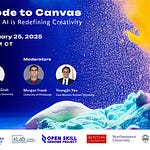Principal Investigators:
Kerri Lemoie, Director, Digital Credentials Consortium (DCC) at MIT
Morgan Frank, Assistant Professor, School of Computing and Information, University of Pittsburgh
Erman Ayday, Assistant Professor, Case School of Engineering, Case Western Reserve University | Faculty Co-director, xLab
Youngjin Yoo, Professor, Weatherhead School of Management, Case Western Reserve University | Faculty Co-director, xLab
Presenter:
Tina Xu, PhD Student, Case School of Engineering, Case Western Reserve University
On Wednesday, February 5, our team at Open Skill Genome Project—a collaboration between Case Western Reserve University, the University of Pittsburgh, and the Digital Credentials Consortium (DCC) at MIT, with support from the Walmart Foundation—shared our vision for how AI and verifiable credentials can revolutionize skill verification and job matching in the first public demo of our project. We introduced our prototype system, which enables individuals to generate verifiable derivative credentials from their academic transcripts and online learning experiences. Traditional credentialing systems are centralized, inefficient, and prone to fraud, making it difficult for both job seekers and employers to navigate the labor market effectively. By integrating natural language processing (NLP) models, our system transforms raw learning data into verifiable skill credentials, empowering individuals to prove their competencies in a secure and flexible way.
During the live demo, we showcased how users can request transcripts to the student server, generate skill-based verifiable derivative credentials, and manage their data through a privacy-preserving digital wallet. In future developments, using zero-knowledge proofs (ZKPs) and trusted computing environments, our technology will ensure that users can control their own data while enabling employers to verify skills without unnecessary personal disclosures. Furthermore, our open-sourced model-agnostic architecture means that different skill assessment models—whether from universities, employers, or third-party platforms—can be integrated to provide more accurate and adaptable credentialing. As we continue developing this technology, we aim to create a transparent, equitable, and skills-driven labor market that benefits both workers and employers.
Thanks to our speakers and to everyone who participated in our webinar. We appreciate the engaging discussion during the Q&A session and look forward to further collaboration in building the future of AI-powered, verifiable digital credentials. We also look forward to seeing you at our next webinar, scheduled for February 25 at 12 p.m. ET, with guest speakers Dokyun “DK” Lee (Boston University) and Matthew Groh (Northwestern University) on the topic of AI and the Future of Creativity. Register now at the link below.
















